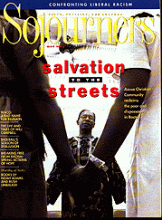An old Haitian peasant recently walked into the jail house in his rural community and began berating the military officer in charge, waving a book at him. The book, received from a human rights organization based in Port-au-Prince, explained in simple language the old man's rights under Haiti's new constitution. Armed with this knowledge against the guns of the local military thugs, the old man insisted that a friend was being illegally held. Perhaps out of shock, the soldiers actually released the friend.
It is the democratic spirit embodied in the old peasant that has been under siege in Haiti since the 1991 military coup that ousted President Jean-Bertrand Aristide, the country's first democratically elected leader. The story provides a glimpse of what is hopeful about Haiti today -- the power of knowledge and organization, the willingness of hundreds of thousands of Haitians to act to build democracy, the impotence of the military behind their mask of violence. "We have tasted democracy for seven months under Aristide," one Haitian explained to me on a recent visit there, "and the sweet taste still lingers in our mouths."
One can almost see Haiti molting, struggling to burst free of the shell of repression, violence, and corruption that has stunted its growth for so long. Haiti is giving birth to its democratic self. The question today is: Can Haiti survive this painful birth, or will it perish in the process?
Read the Full Article

